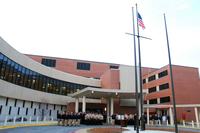Note: As of 2018, the way the commissary sets prices changed to allow prices to fluctuate beyond wholesale rules thanks to a change to federal law. In 2020, the law was changed to allow veterans to shop at the commissary.
If all veterans were allowed to use the commissary, wouldn't that help with the deficit that the commissary has?
Your logic is really spot on, except for one thing: You're assuming that the way the commissary operates is logical.
It's not.
If the commissary were like a normal grocery store, the more people who shopped there, the more money the store would make and the less taxpayer money it would need to stay open. When a normal store sets prices, it factors in operating costs so that at the end of the day it will have enough income to fund the business and make a little profit. Keeping the lights on and paying employees, for example, are things that are factored into the price charged for each item.
Commissary 101: How to Shop at the Commissary
But the commissary is not a normal grocery store. By law, it has to sell items at cost. That means what shoppers pay for any given item covers only the cost that the commissary had to pay to get that item, nothing else. A 5 percent surcharge on all purchases pays for building and technology upkeep.
So what does that mean for shoppers? It means the commissary actually operates at a bigger deficit when more people shop there. Like a recent report on the system points out, every time an additional shopper enters the store, the system loses extra money. That's because all of those shoppers must be supported by staff and infrastructure. All of the items they buy must be restocked on the shelf by an employee or a contractor. And since none of the purchases cover the cost of those people, their employment must be funded by taxpayers.
The commissary is not designed to be a for-profit business, or even a business that covers its own costs. It's designed to be a non-cash benefit for users. Right now, the commissary receives about $1.4 billion in taxpayer funding each year. The majority of that goes to pay employees.
If all non-retiree veterans were allowed to shop in the commissary, it would cost much more to run the stores, and that would cost taxpayers much more.
Keep Up with the Ins and Outs of Military Life
For the latest military news and tips on military family benefits and more, subscribe to Military.com and have the information you need delivered directly to your inbox.





















